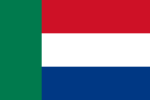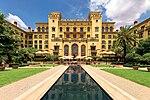Gauteng

Gauteng ( khow-TENG, Sotho-Tswana for 'place of gold'; Zulu: eGoli or iGoli [îːˈgóːlì]) is one of the nine provinces of South Africa. Situated on the Highveld, Gauteng is the smallest province by land area in South Africa. Although Gauteng accounts for only 1.5% of the country's land area, it is home to more than a quarter of its population (26%). Highly urbanised, the province contains the country's largest city, Johannesburg, which is also one of the largest cities in the world. Gauteng is the wealthiest province in South Africa and is considered the financial hub of not only South Africa but the entire African continent; the financial activity is mostly concentrated in Johannesburg. It also contains the administrative capital, Pretoria, and other large areas such as Midrand, Vanderbijlpark, Ekurhuleni and the affluent Sandton. Gauteng is the most populous province in South Africa with a population of approximately 16.1 million according to mid year 2022 estimates.
Excerpt from the Wikipedia article Gauteng (License: CC BY-SA 3.0, Authors, Images).Gauteng
Geographical coordinates (GPS) Address Nearby Places Show on map
Geographical coordinates (GPS)
| Latitude | Longitude |
|---|---|
| N -26 ° | E 28 ° |
Address
2055 , Kengies Ext 21
Gauteng, South Africa
Open on Google Maps



